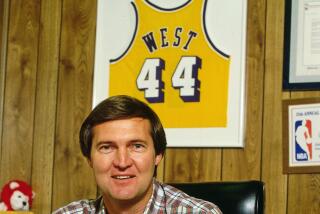Joetta Clark Leaned on Dad to Learn to Run Her Life
- Share via
Joetta Clark never suspected how famous her father could become just by carrying a baseball bat. It startled her when, one day, she picked up a copy of Time magazine and found her father’s face on the cover.
Then, when they made a movie of his life and hired one of America’s most distinguished actors to portray him, it really boggled Joetta’s mind.
“That man with the baseball bat,” she said, “that man was somebody I didn’t know.”
The man she knew was the father who took Joetta and her younger brother from town to town for track meets, making time at every location to visit a local landmark or museum or historic monument.
Sometimes they stopped off at a state capitol building to study the legislative body, or at a planetarium to study a celestial body. Or sometimes Joetta’s father simply wanted to point out certain events that altered the lives of certain citizens, for better or worse.
“Once, I remember, we went to Xenia, Ohio,” she said. “Remember the terrible tornado that touched down there? My father just wanted us to see the town, to connect the place with the event.”
The Jack-in-the-Box track meet at UCLA, where the starter’s gun goes off this morning at 11:30, is the event that brings to town Joetta Clark, one of the great 800-meter runners in the United States and the daughter of Joe Clark, the bat-wielding high school principal from Paterson, N.J., whose unique approach to discipline was dramatized in the Morgan Freeman film “Lean On Me.”
Joetta, 27, is the woman to beat in today’s two-lapper and, possibly, in the 1992 Barcelona Olympics. She became the first American to defeat the splendid East German runners, Olympic champion Sigrun Wodars and Christine Wachtel, in the Millrose Games at Madison Square Garden. She clocked 2:02.16, leading from start to finish.
It was the greatest victory for the University of Tennessee graduate, who says she still hasn’t hit peak form and hopes to do so at this summer’s The Athletics Congress meet.
Also, if nothing else, Joetta’s thrilling race at the Garden must have convinced her colleagues from work that she shouldn’t yet put her track shoes in mothballs and concentrate on her “day” job. Fact is, Joetta’s other job often keeps her on duty well into the night.
She works in the New Jersey state’s attorney general’s office as an investigator. Joe Clark clearly taught his children right from wrong. Joetta’s principal investigations deal in “drug diversion,” as when licensed physicians illegally sell or dispense non-prescription pharmaceuticals.
“We’re not talking crack or heroin here,” Joetta said. “It might be something along the lines of Percodan. But, issued improperly, it can be just as down and dirty and just as deadly as somebody giving you street drugs or bopping you on the head. In some cases, probably worse.”
Joetta Clark specializes in white-collar crime, often going undercover to nail a guilty party. She may be the first woman in the 1990s to be featured on “Wide World of Sports” and “60 Minutes” on the same weekend.
As a runner, she is hitting her stride. Last year she got her first world ranking and shot up to No. 1 in this country for the first time. Her Millrose time was the seventh-best by an American woman. Indoors in 1989, Joetta turned a 2:00.98, the second-best ever. Next goal: Mary Decker Slaney’s indoor U.S. record of 1:58.9.
She is hardly an overnight sensation, either. Joetta Clark has been running in the Millrose, for example, since 1977.
Four years before, when she was only 10, Joetta’s father took her to the Garden to watch the meet. He took great interest in both their athletic and academic careers, eventually sending his daughter to Tennessee and his son to Villanova. Joe Clark Jr. made it to the ’88 Olympic trials and has done the 1,500 meters in 3:41.5, which isn’t at all bad.
What caught the Clark children by surprise was the wave of attention that came their father’s way once word got out that he was lugging a baseball bat to school as a symbol of how he, as principal, was prepared to go to any lengths to maintain discipline. At home they knew Joe Clark could be stern and strict, but they never envisioned him as a designated hitter.
“We were big on family awareness,” Joetta said. “My parents instilled proper values in us, taught us the meaning of sacrifice and how to turn to one another for help or advice. I got a lot of reinforcement from my family.
“When I took up running, they made sure I also took up the piano. When we traveled to AAU meets or whatever and visited historical sights, we might also visit the Astrodome or maybe Disneyland. There was always a proper balance. I like to think of it as a pretty good example of family motivation.”
More to Read
Go beyond the scoreboard
Get the latest on L.A.'s teams in the daily Sports Report newsletter.
You may occasionally receive promotional content from the Los Angeles Times.






